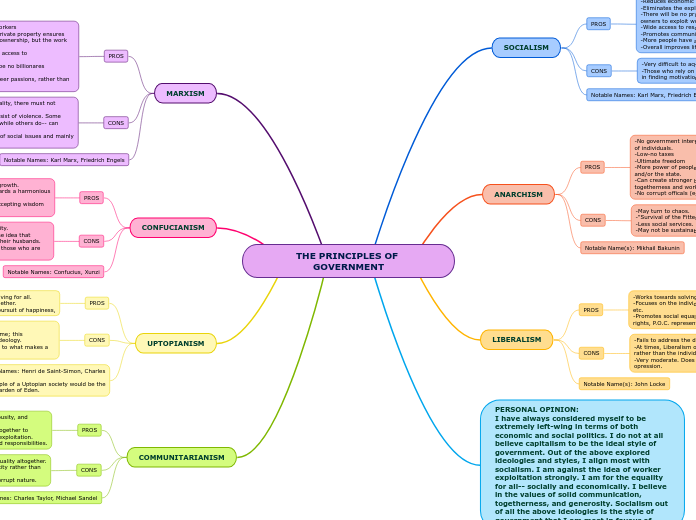
PROS
-Reduces economic disparities and overall unequality.
-Eliminates the exploitation of the working class.
-There will be no private property, therefore there will be no owners to exploit workers.
-Wide access to resouces.
-Promotes community and better, fair communication.
-More people have a say.
-Overall improves life quality.
CONS
-Very difficult to achieve without corruption.
-Those who rely on incentives to work hard may find difficulty
in finding motivation to work.
Notable Names: Karl Marx, Friedrich Engels
PROS
-No government interference in the lives
of individuals.
-Low-no taxes
-Ultimate freedom
-More power of people rather than cooperations
and/or the state.
-Can create stronger bonds within communities; promotes
togetherness and working for common goals.
-No corrupt officals (ex. government, police force).
CONS
-May turn to chaos.
-"Survival of the Fittest" may become a reality.
-Less social services.
-May not be sustainable long-term.
Notable Name(s): Mikhail Bakunin
PROS
-Works towards solving social issues.
-Focuses on the individual; individual rights, representation, etc.
-Promotes social equality, ex women's liberation LGBTQ+ rights, P.O.C. representation, etc.
CONS
-Fails to address the dispairities created under capitalism.
-At times, Liberalism overlooks the welfare of a community, rather than the individual.
-Very moderate. Does not fully address the roots of systemic opression.
Notable Name(s): John Locke
PROS
-Aims to cease the exploitation of workers
own the means of production). No private property ensures that no one is being payed for their ownership, but the work they perform.
-Emphasizes equality; everyone has access to
the same resources.
-No financial disparities-- there will be no billionares
while people starve.
-Promotes people following their career passions, rather than
worrying about money.
CONS
-There is a hefty reliance on morality, there must not
be greed or desire for power.
- The desired revolution may consist of violence. Some
may not agree with this method while others do-- can
create conflict.
-Marx minimizes the importance of social issues and mainly
discusses economic issues.
Notable Names: Karl Marx, Friedrich Engels
PROS
-Promotes character/spiritual growth.
-Teaches values that work towards a harmonious
society.
-Respects both learning and accepting wisdom
from those around you.
CONS
-Encourages hierarchy which leads to inequality.
- Ideology is ridden with sexism. Promotes the idea that woman are and must remain subservient to their husbands.
-The learning process can consist of shaming those who are
still learning.
Notable Names: Confucius, Xunzi
PROS
-Aims to achieve the ideal living for all.
-Eliminates inequality alltogether.
-Promotes the individual's pursuit of happiness,
CONS
-Has yet to be nearly achieved.
-The idea of perfect seems unrealistic to some; this discourages any attemp for living out this ideology.
-It may be difficult to reach a concensus as to what makes a
"uptopian society".
Notable Names: Henri de Saint-Simon, Charles
Fourier.
An example of a Uptopian society would be the
Bible's Garden of Eden.
PROS
-Promotes ideas such as unity, generousity, and
strong relationships.
-Essentially euqual; everyone works together to
achieve a common goal-- there is no exploitation.
-There is a balance between rights and responsibilities.
CONS
-Less emphasis on individual growth/ individuality altogether.
- May put too much emphasis on social identity rather than
persona.
-May possibly resort to peer pressure or a corrupt nature.
Notable Names: Charles Taylor, Michael Sandel